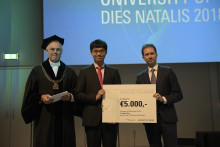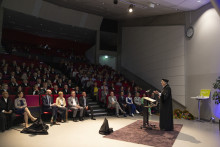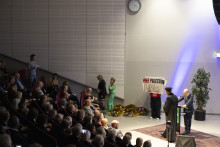It wasn’t the first prize that his doctoral thesis has brought him. Zhu recently received the national NWO Physics Thesis Award. Yet, he was still surprised to win. ‘I didn’t expect it at all,’ he says. ‘I didn’t even know my supervisor nominated me. I think the Overijssel PhD Award is very competitive so it must have been a very hard decision to choose the winner.’
In his thesis, Zhu focused on two kinds of turbulence and flow, combined with wall roughness. He combined numerical simulations and experiments and provided explanations of turbulence and flows under conditions of different kinds of wall roughness. Zhu’s research has been published in top quality journals and his PhD was awarded Cum Laude.
The young scientist’s findings could have applications in various fields, ranging from geo-and astrophysics to engineering. ‘The main topic of my research is turbulent convection, either thermally driven or driven by rotation. This convection is necessary for a deeper understanding of various natural phenomena. You can find it in a cooking pan, the eruption of volcanos or winds in the atmosphere,’ explains Zhu. ‘If it comes to practical applications, one example would be cooling systems in nuclear plants, where we might be able to reduce the heat based on better understanding of convection.’
Xiaojue Zhu is currently working as a postdoctoral researcher at Harvard, where he aims to use machine learning to further the understanding of turbulence. ‘I’d like to be able to formulate physical laws based on my research.’







